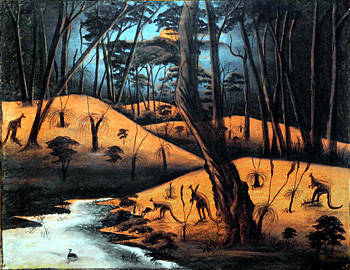|
Intermix.org.uk is a website for the benefit
of mixed-race families, individuals and anyone who feels they have a multiracial
identity and want to join us. Our mission is to offer a view of the mixed-race experience, highlighting icons, film, books, poetry, parenting techniques, celebrities, real lives and much more. Our online forums are a great place to meet others, ask questions, voice your opinions and keep in touch. Sign up for our monthly newsletter and delve into our pages. Want to join in? Become an Intermix member to take part: |
Melbourne Takes The First Step
 New
code to stamp out exploitation
New
code to stamp out exploitation
of indigenous artists.
Whilst in the U.K. the derogatory term half-caste has
almost faded from view in the media, Australia continues to use it.
A search of internet news sites will pull up countless stories about
Aborigines that include the out-of-date word.
Now a new voluntary code of practice for galleries and retailers of
indigenous art in Melbourne and passed by the city's council, is leading
the way by attempting to stamp out derogatory language such as Abo and half-caste.
The code addresses the unethical behaviour that has dogged indigenous
art since the 1970's.
Written by Sydney lawyer Terri Janke in consultation with the council's
Indigenous Arts Advisory Panel, its scope includes authentication, copyright
and artist payments.
It requires dealers to develop
relationships with indigenous artists that are 'based on trust, respect,
mutual understanding and responsibility'.
The code attempts to stamp out exploitation of indigenous artists, such
as paying for work with alcohol or drugs, and operating sweatshops.
Careful use of the Aboriginal and Torres Strait Islander flags and acknowledging
country and traditional owners at gallery openings are also required.
No forged or fake indigenous art can be sold on the internet, and names,
logos and biographical information from Aboriginal arts centres must
remain the property of the owners.
It also encourages Melbourne
CBD galleries and retailers to promote southeastern Australian indigenous
artists, whose contribution is often overlooked.
Breaching the code could lead to subscribers being stripped of their
council status, with the possibility of further action by the Australian
Competition and Consumer Commission and Consumer Affairs Victoria.
The council's decision puts pressure on the federal Government, which
is expected to announce in the next two weeks its plans for a parliamentary
inquiry into the exploitation of Aboriginal artists.
Aborigines continue to suffer in Australia and a senior minister recently recommended installing white administrators in some of Australia's more troubled Aboriginal communities, re-igniting argument about a problem that has divided the country for decades.
Tony Abbott, the health minister, said
the 500,000-strong indigenous population was falling so far behind the
mainstream community that only a return to the 'paternalistic' government
policies of the 1950s would save them.
Mr Abbott's speech was condemned by Aboriginal leaders, welfare workers
and the Labour opposition.
They accuse him of wanting to return to the racist policies of the past
- when mixed-race aboriginal children were forcibly removed from their
parents and indigenous people were denied the right to vote.
Chris Evans, the opposition indigenous affairs spokesman, said: "What
we know of 200 years of Australian history is that paternalism didn't
work.
'I think Aboriginal people would be very concerned that we're going to
have another experiment enacted upon them by the government.'
But the fiercest criticism came from Julia Gillard, Labour's health spokesman.
She said it was not Mr Abbott's place to lecture Aborigines on the state
of their health: 'Tony Abbott... should be taking responsibility for
the fact that after 10 long years of the [John] Howard government we
haven't made any difference to the huge gap in life expectancy between
indigenous Australians and other Australians.'
Source:
